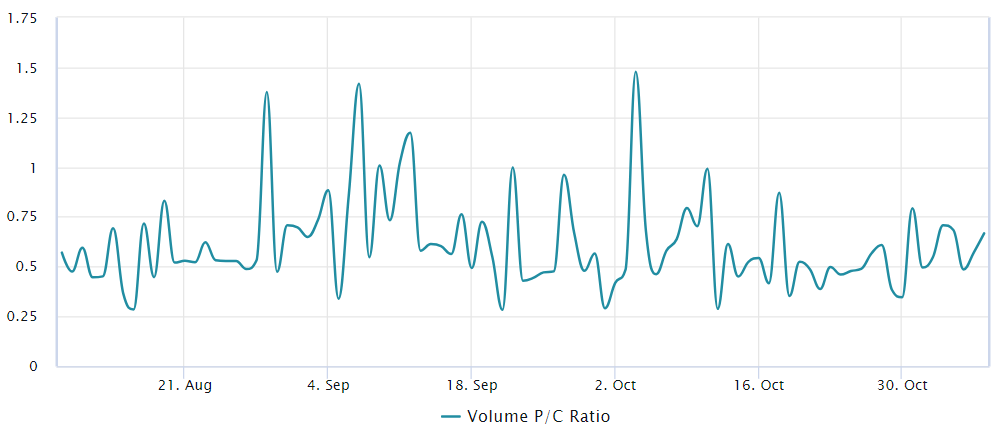Bitcoin (BTC) has been trading within a narrow 4.5% range over the past two weeks, indicating a level of consolidation around the $34,700 mark.
Despite the stagnant prices, the 24.2% gains since Oct. 7 instill confidence, driven by the impending effects of the 2024 halving and the potential approval of a Bitcoin spot exchange-traded fund (ETF) in the United States.
Investors worry about the bearish global economic outlook
Bears expect further macroeconomic data supporting a global economic contraction as the U.S. Federal Reserve holds their interest rate above 5.25% in order to curb inflation. For instance, on Nov. 6, China exports shrank 6.4% from a year earlier in October. Furthermore, Germany reported October industrial production down 1.4% versus prior month on Nov. 7.
The weaker global economic activity has led to WTI oil prices dipping below $78 for the first time since late July, despite the potential for supply cuts from major oil producers. Remarks by U.S. Federal Reserve Bank of Minneapolis President Neel Kashkari on Nov. 6 has set a bearish tone, prompting a ‘flight-to-quality’ response.
Kashkari stated:
“ We haven’t completely solved the inflation problem. We still have more work ahead of us to get it done.”
Investors have sought refuge in U.S. Treasuries, resulting in the 10-year note yield dropping to 4.55%, its lowest level in six weeks. Curiously, the S&P 500 stock market index has reached 4,383 points, its highest level in nearly seven weeks, defying expectations during a global economic slowdown.
This phenomenon can be attributed to the fact that the firms within the S&P 500 collectively hold $2.6 trillion in cash and equivalents, offering some protection as interest rates remain high. Despite increasing exposure to major tech companies, the stock market provides both scarcity and dividend yield, aligning with investor preferences during times of uncertainty.
Meanwhile, Bitcoin’s futures open interest has reached its highest level since April 2022, standing at $16.3 billion. This milestone gains even more significance as the Chicago Mercantile Exchange (CME) solidifies its position as the second-largest market for BTC derivatives.
Healthy demand for Bitcoin options and futures
Recent use of Bitcoin futures and options have made media headlines. The demand for leverage is likely fueled by what investors believe are the two most bullish catalyst for 2024: the potential for a spot BTC ETF and the Bitcoin halving.
One way to gauge market health is by examining the Bitcoin futures premium, which measures the difference between two-month futures contracts and the current spot price. In a robust market, the annualized premium, also known as the basis rate, should typically fall within the 5% to 10% range.
Notice how this indicator has reached its highest level in over a year, at 11%. This indicates a strong demand for Bitcoin futures primarily driven by leveraged long positions. If the opposite were true, with investors heavily betting on Bitcoin’s price decline, the premium would have remained at 5% or lower.
Another piece of evidence can be derived from the Bitcoin options markets, comparing the demand between call (buy) and put (sell) options. While this analysis doesn’t encompass more intricate strategies, it offers a broad context for understanding investor sentiment.
Related: Bitcoin Ordinals see resurgence from Binance listing

Over the past week, this indicator has averaged 0.60, reflecting a 40% bias favoring call (buy) options. Interestingly, Bitcoin options open interest has seen a 51% increase over the past 30 days, reaching $15.6 billion, and this growth has also been driven by bullish instruments, as indicated by the put-to-call volume data.
As Bitcoin’s price reaches its highest level in 18 months, some degree of skepticism and hedging might be expected. However, the current conditions in the derivatives market reveal healthy growth with no signs of excessive optimism, aligning with the bullish outlook targeting $40,000 and higher prices by year-end.
This article is for general information purposes and is not intended to be and should not be taken as legal or investment advice. The views, thoughts, and opinions expressed here are the author’s alone and do not necessarily reflect or represent the views and opinions of Cointelegraph.




